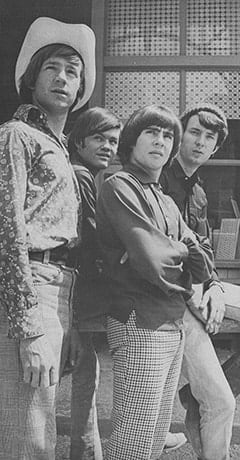
Management Disputes Boil Backstage While Mike, Davy, Micky and Peter Say “The Show Must Go On”
As far as the public is concerned, the tale of The Monkees is all one great big American success story. The quartet of singing actors is racking up just one triumph after the other on TV, recordings, and in personal appearances.
But before we tell you some of their latest triumphs, we will take you behind the scenes a bit and give you some sobering facts about the problems that The Monkees are facing.
Because they are part of show business, The Monkees are bound to run into some of the many crises and difficulties that show business, just as any business, entails.
It might not be what we all want to hear about the pop stars we enjoy so much. But perhaps it is better always to keep in mind that pop stars, no matter where they came from or how far they have gone, are human beings susceptible to human difficulties, flaws and shortcomings.
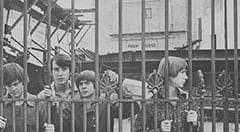
The biggest behind-the-scenes problem for The Monkees broke in the spring of this year, although the millions of fans of Mike Nesmith, David Jones, Peter Tork and Micky Dolenz were not aware of the power struggle.
It was not a happy situation, but two of the management figures most responsible for the success of The Monkees had a major disagreement. The two were Don Kirshner, head of Screen Gems-Columbia Pictures Music, and Bert Schneider, manager of The Monkees. The issue, as it filtered out behind closed doors, was that Schneider, who is the son of Columbia Pictures president, Abe Schneider, wanted Kirshner to stay clear of future recordings by The Monkees. Evidently harsh words had been exchanged between The Monkees’ manager and recording executive about just how recording sessions were to be run. Even The Monkees were getting into the act, supposedly pleading for more of a say in just what and how they recorded. Because Kirshner had been so vital a figure in “the winning formula” on recordings by The Monkees, this was understandably a sore point.
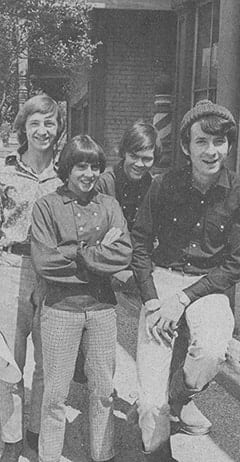
Although it might disillusion untold millions of Monkees fans to know it, it is an open secret in the music trade that many of the fine vocal effects on their first two LPs were put in by non-Monkees, and that even some of the instrumental background had been “beefed up” by studio musicians. (Let us hasten to say that The Monkees have done so well in personal appearances since this dispute broke out that the question of whether it was or wasn’t The Monkees alone on the first two LPs is academic.)
As reported in Variety, the trade weekly, this spring: “…The Monkees have been reading their press notices and now not only want to sing, but to sing their own songs. It’s understood that Schneider is sympathetic to this idea while Kirshner does not want to change the success formula…”
So the battle raged behind the scenes, while Mike, Davy, Peter and Micky were all smiles, all joy and apparently unconcerned about anything. Actors they certainly are, and also extremely well-poised public figures, who never allowed themselves to be quoted about this entire ruckus.
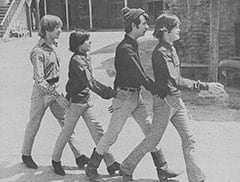
Perhaps nothing so explains the entire situation with The Monkees better than the absolute speed with which their careers soared. They were almost not ready for it. They had only six TV shows filmed, only one LP cut and suddenly, last fall, it all exploded with enormous force. The mail received by N.B.C.-TV, for instance, was absolutely delighting the network. In September there were 101 pieces of mail, which rose meteorically until this January, when more than 52,000 pieces of Monkee mail had been received by the network.
The success of the recordings by The Monkees is so well known that we don’t have to repeat the figures, but just say that they scored with great success here and even revitalized the slowly ebbing pop scene in England.
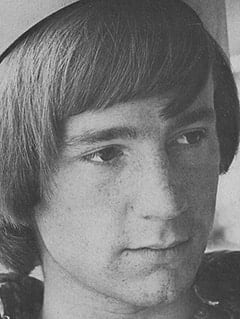
Info Credit: Gene Trindl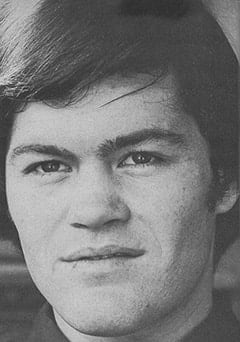
Info Credit: Gene Trindl
Info Credit: Gene Trindl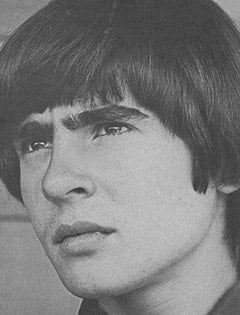
Info Credit: Gene Trindl
Fantastic success brings problems with it
Everything is Better at the Box-Office Than It is in the Front-Office.
Then came the personal appearances, which between the end of December and the end of March had done the astronomical box-office gross of nearly $750,000. The reactions at the box-office substitute Monkees for Beatles. The speed with which Monkees concerts were selling out was delighting everyone. In Toronto, a hall holding 18,200 seats was sold out in 24 hours, five weeks before The Monkees arrived!
Still another aspect of no one’s being fully prepared for the great popular acclaim are the TV shows. The enormous time and preparation that even two minutes of their fantasy-interludes take to rehearse and film would stagger the imagination. This sort of spontaneity on camera takes hours of work and even the hardiest of Monkees’ fans will admit that the quality of the show has declined since last September.
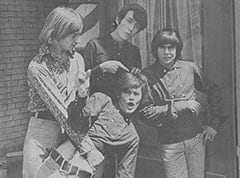
A good solid summer break will probably clear up most of the problems facing The Monkees. This will give them more time to prepare their TV shows, give their script-writers more time to find stronger ideas, and give their management more time to settle their dispute over recordings. Add to all this the fact that The Monkees have another 35 or so concerts planned for the rest of 1967, and the question comes up: Who wants to be a pop star?
If you really would like all the fame, all the glory, all the money, you might as well realize that it involves an enormous amount of work, so much time that one is nearly married to the job, and it also means the sort of disputes and problems behind the scenes that we have told you about in this article.
We will have a lot more to say about The Monkees and their real story, not just their make-believe stories, in the future. We hope you are as interested in the truth as you are in the fun of The Monkees.



